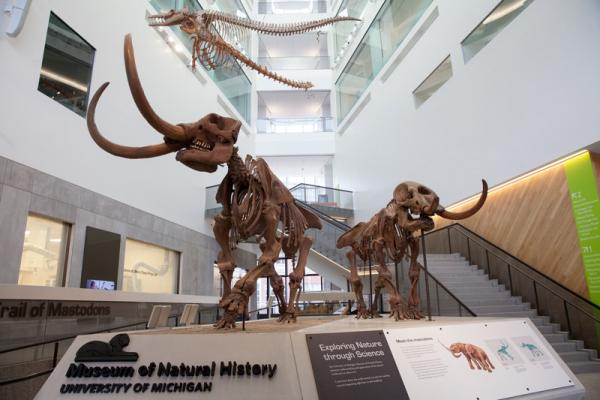MAS Lecture | Underwater Carcass Storage: Evidence for the Role of Proboscideans in Subsistence Practices of Pleistocene Humans
Daniel Fisher, University of Michigan

Thursday, January 21, 2021
7:30-9:00 PM
Off Campus Location
The fossil record of late Pleistocene proboscideans (mastodons and mammoths) in eastern North America has often been understood as consisting of animals that died of natural causes and were preserved in wetland settings with little or no evidence of human association. However, close inspection of many of these sites reveals patterns of bone processing that suggest instead that proboscidean carcass parts were brought to pond or bog settings by humans and were stored underwater to protect them from scavenging and preserve them for human consumption in times of food shortage. These sites thus shed new light on human subsistence and early history in North America.
Zoom lecture
Thursday, January 21, at 7:30 pm
MAS lectures are free and open to the public. For details about how to join the meeting, please contact one of the following:
• Ann Zinn at annczinn@umich.edu
• John Farmer at ajf-jlf@sbcglobal.net
• Grant Faber at gfaber@umich.edu
This lecture is sponsored by the Michigan Archaeological Society.
To learn more about the MAS, please visit http://www.miarch.org/
Zoom lecture
Thursday, January 21, at 7:30 pm
MAS lectures are free and open to the public. For details about how to join the meeting, please contact one of the following:
• Ann Zinn at annczinn@umich.edu
• John Farmer at ajf-jlf@sbcglobal.net
• Grant Faber at gfaber@umich.edu
This lecture is sponsored by the Michigan Archaeological Society.
To learn more about the MAS, please visit http://www.miarch.org/
| Building: | Off Campus Location |
|---|---|
| Location: | Virtual |
| Website: | |
| Event Type: | Livestream / Virtual |
| Tags: | Anthropology, Archaeology, Lecture, Prehistory, Virtual |
| Source: | Happening @ Michigan from Kelsey Museum of Archaeology, Earth and Environmental Sciences, Museum of Natural History, Museum of Anthropological Archaeology, Kelsey Museum of Archaeology Lectures |

